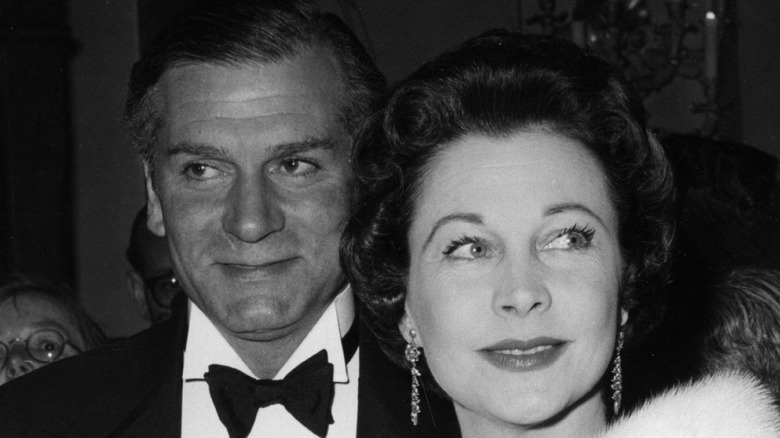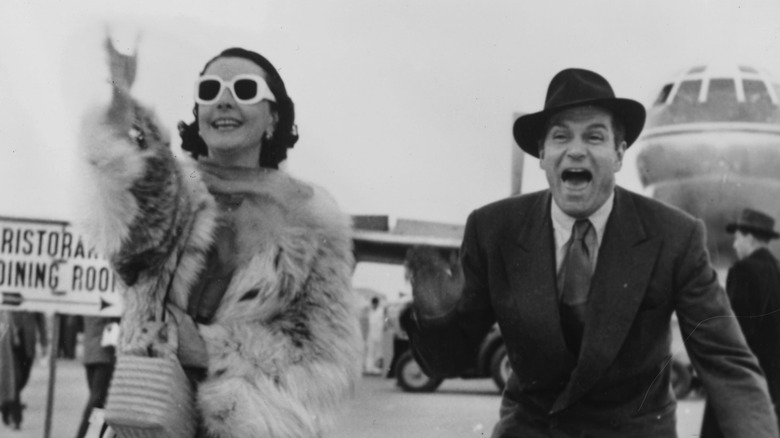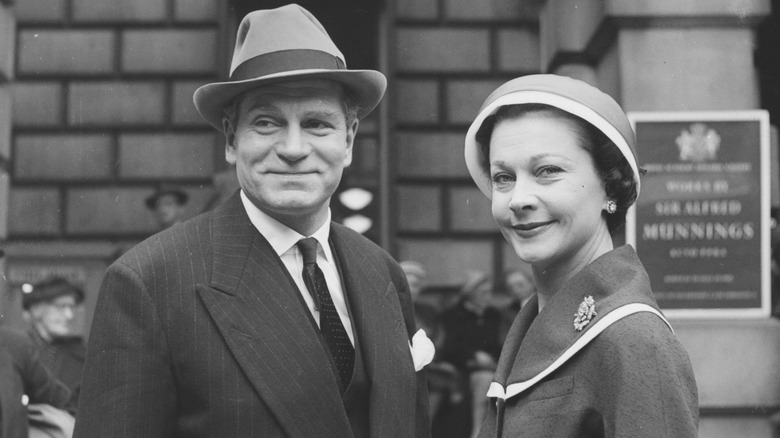The Truth About Vivien Leigh And Laurence Olivier's Relationship
Despite the fact that they were both married to other people when they met, actors Laurence Olivier and Vivien Leigh both felt a spark, per Harper's Bazaar. They met in London, England in 1936 when Olivier stopped by to congratulate Leigh after her performance in the play "The Mask of Virtue." According to author Michelangelo Capua's "Vivien Leigh: A Biography," Leigh immediately told a friend, "That's the man I'm going to marry." She was right, despite already being married to lawyer Herbert Leigh Holman while Olivier was married to actress Jill Esmond.
A year later, they were cast as lovers in the film "Fire Over England" and began an affair. Olivier later told biographer Michael Munn, "This wasn't just out of lust. This was love that I really didn't ask for but was drawn into." According to Marie Claire UK, Leigh's own commentary about the affair was equally passionate: "I don't think I have ever lived quite as intensely since. I don't remember sleeping, ever; only every precious moment that we spent together."
A year later, Olivier left Leigh behind in England to film an adaptation of "Wuthering Heights." As reported by The Guardian, the two exchanged steamy love letters during their time apart, 200 of which were made public in 2015. Among the less explicit excerpts is one from Leigh reading, "If we loved each other only with our bodies I suppose it would be alright. I love you with much more than that. I love you with, oh everything somehow, with a special kind of soul."
Olivier and Leigh left their spouses and married each other
As reported by Harper's Bazaar, Vivien Leigh started showing signs of mental illness around the time Olivier left England. As there was no diagnosis or treatment available for bipolar disorder, Leigh didn't receive the help she needed. Despite getting a reputation for being difficult to work with, Leigh was cast as Scarlett O'Hara in 1939's "Gone With The Wind" after Olivier recommended her to a theater agent.
During filming, Leigh often wrote to Olivier about her fears that the film would be a disaster; she was often manic during the production. Olivier wrote back supportive letters, including one that read "... I am afraid you may become just boring. Never to me ... But to yourself and because of that to others." The film was a hit, Leigh was a star, and Olivier and Leigh married in 1940. They went on to make two movies together, "21 Days Together" and "That Hamilton Woman," and starred and invested thousands of dollars in a Broadway production of "Romeo and Juliet," which received terrible reviews, several of which referenced their relationship starting as an adulterous affair.
While filming "Caeser and Cleopatra" in 1945, Leigh slipped and suffered a miscarriage, which led to a severe depressive episode. She took a break from acting just as Olivier's career began soaring. In 1948, they toured New Zealand and Australia doing theater performances, but Leigh was often too ill to perform and she and Olivier fought constantly. Olivier would later say he "lost Vivien" during that trip.
Leigh said her most lauded role "tipped her over into madness"
In 1949, Vivien Leigh played Blanche DuBois in a London production of the play "A Streetcar Named Desire" and went on to reprise the role in the 1951 film adaptation as well. She received enormous amounts of praise for her turn as the vulnerable and mentally ill Blanche, including winning an Oscar, but would later say, per Legacy, that it "tipped me over into madness." In 1953 while filming "Elephant Walk" in Sri Lanka, she began to hallucinate and her usual insomnia worsened. She was flown back to Los Angeles, but tried to jump out of the plane during the flight and when she got back, she barricaded herself in her dressing room. She was eventually sedated and flown to London where she underwent electric shock therapy, as reported by Marie Claire UK.
Leigh had a second miscarriage in 1956, per Harper's Bazaar, and accompanied Olivier on his tour for the play "Titus Andronicus," often directing angry outbursts at her husband and the rest of the cast. The couple separated in 1958; Leigh began dating actor Jack Merivale, who was her partner until her death from tuberculosis in 1967, and Oliver began dating his future wife, actress Joan Plowright. Even after their 1960 divorce, Oliver and Leigh continued writing to each other. As quoted by The Guardian, he sent her a note weeks before she died signed, "Sincerest love darling, your Larry."


